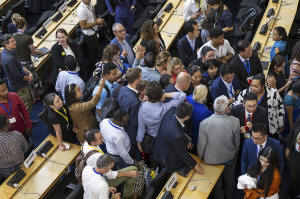Countries deadlocked on plastic production and chemicals as talks on a
global treaty draw to a close
[August 15, 2025] By
JENNIFER McDERMOTT
GENEVA (AP) — Negotiations on a global treaty to end plastic pollution
will draw to a close Friday, as nations remain deadlocked over whether
to tackle the exponential growth of plastic production.
A new draft of the treaty was expected Thursday, the last scheduled day
of negotiations, and a meeting for all of the delegates was scheduled.
It was repeatedly postponed until just before midnight. Luis Vayas
Valdivieso, the chair of the negotiating committee, called delegates to
the assembly hall, but said consultations on the revised draft were
still ongoing.
He adjourned in less than a minute and quickly left the stage. Some in
the audience gasped. They will reconvene Friday.
Andreas Bjelland Eriksen, Norway’s minister for climate and the
environment, said prolonging the meeting is much better than ending it
Thursday. Norway and many other delegations have said the current treaty
text is unacceptable.
“It means that the chair still believes that it’s possible to drive this
process forward. That’s great," he said.
The draft of the treaty released Wednesday wouldn’t limit plastic
production or address chemicals used in plastic products.
Instead, it's centered on proposals where there's broad agreement — such
as reducing the number of problematic plastic products that often enter
the environment and are difficult to recycle, promoting the redesign of
plastic products so they can be recycled and reused, and improving waste
management.

It asks nations to make commitments to ending plastic pollution, rather
than imposing global, legally-binding rules.
French President Emmanuel Macron said the “lack of ambition” in the
draft treaty was unacceptable, and that agreeing to a global treaty
against plastic pollution “is our opportunity to make a difference.”
“Every day, our health is more threatened. What are we waiting for to
take action?” he wrote on LinkedIn. “I call on all states present in
Geneva to adopt a text that meets the environmental and health
emergency. For our health. For our environment. For our children.”
The talks involve representatives from 184 countries and more than 600
organizations.
About 100 countries want to limit production
Eriksen said Norway's representatives won't leave Geneva with “just any
treaty.” Norway is helping to lead a coalition of countries called the
High Ambition Coalition that want a comprehensive approach to ending
plastic pollution, including reducing production.
“We are going to be flexible, but at the same time ambitious in our
positions, and work with every single hour that we have left to bring
this to a conclusion, a positive conclusion, because the world needs a
plastics treaty now.”
Eriksen said he'll stay “cautiously optimistic” until the bitter end.
Every year, the world makes more than 400 million tons of new plastic,
and that could grow by about 70% by 2040 without policy changes. About
100 countries want to limit production as well as tackle cleanup and
recycling. Many have said it’s essential to address toxic chemicals.
Powerful oil and gas-producing nations and the plastics industry oppose
production limits. They want a treaty focused on better waste management
and reuse. They have raised different concerns with the draft text,
saying it doesn’t have the scope they want to set the parameters of the
treaty or precise definitions.

[to top of second column] |

Delegates reacts during a plenary session of Second Part of the
Fifth Session of the Intergovernmental Negotiating Committee on
Plastic Pollution (INC-5.2), at the European headquarters of the
United Nations in Geneva, Switzerland, Thursday, Aug. 14, 2025.
(Martial Trezzini/Keystone via AP)
 Proposals on plastic products
Luay Almukhtar, head of Iraq's delegation, said Iraq would not
support a treaty that reduces the production of polymers used to
make plastics because it's not in their interest and it could
negatively impact society and economies.
But he said Iraq supports restricting certain chemical additives for
some applications and reducing some single-use and short-lived
plastic products. Limiting those products, in turn, would reduce
plastic production, he added. He hopes to leave Geneva with a
treaty.
“Plastic pollution is a big environmental issue and we have to work
together to defeat it. That’s why we are here,” he said. “We try to
be a bridge, in the middle, on this issue and we are also practical.
It's a balanced approach between environment and economy.”
Camila Zepeda, from Mexico's Ministry of Environment and Natural
Resources, said it doesn't seem feasible at this stage to get a
limit on production. But, she said, they want to see more in the
treaty on sustainable production and consumption than the brief
mention in the current preamble.
Mexico and Switzerland are also leading the push for the article to
address problematic plastic products, including chemicals and
single-use plastics.
“We are on the final stretch, but we remain hopeful and we remain
committed to making sure that we’re putting back in the text some
provisions that will allow us to to strengthen it, to deliver, and
to have an impact," she said.
Sixth round of talks
It’s the sixth time nations are meeting and the 10th day of
negotiations. Talks last year in South Korea were supposed to be the
final round, but they adjourned in December at an impasse over
cutting production.
Some in attendance wondered whether the outcome in Geneva will be
the same.

Sivendra Michael, Fiji’s permanent secretary for environment and
climate change, emphatically rejected the idea of another meeting.
It is costly, unfair, and tedious to travel so far to continuously
restate positions, he said Thursday. He said he firmly believed this
meeting should conclude with a formal treaty that will be acceptable
to all.
However, Hiwot Hailu, chief of staff for the Environmental
Protection Authority of Ethiopia, said Ethiopia supports meeting
again if nations can't reach agreement on financing the accord and
addressing the full lifecycle of plastics, including production,
design and disposal.
It would be better to not have a treaty, rather than a weak one,
Hailu said.
Jessika Roswall, the European commissioner for the environment, said
the treaty must cover the full lifecycle of plastics and be able to
evolve over time with science.
“A weak, static agreement serves no one,” she said in a statement.
“The next few hours will show whether we can rise to the moment.”
All contents © copyright 2025 Associated Press. All rights reserved |